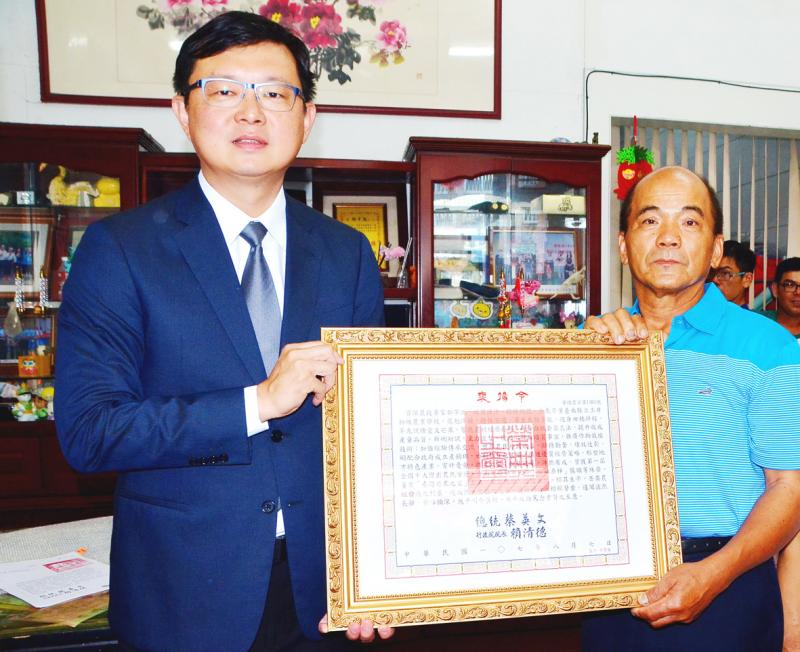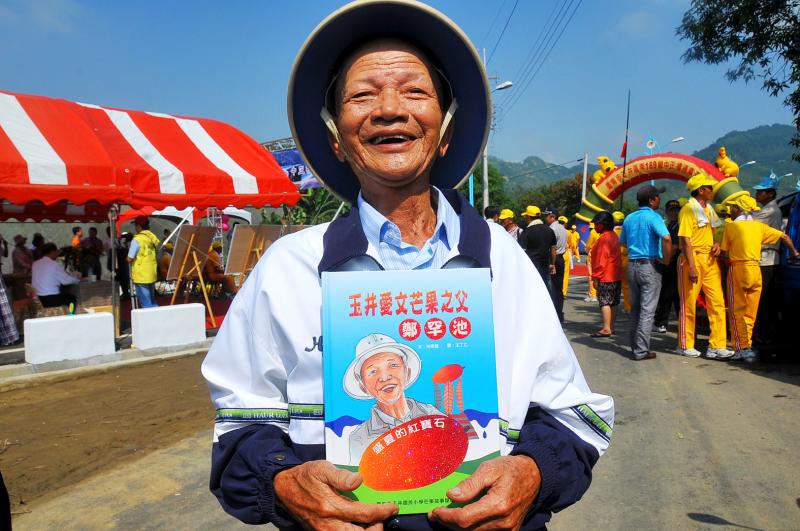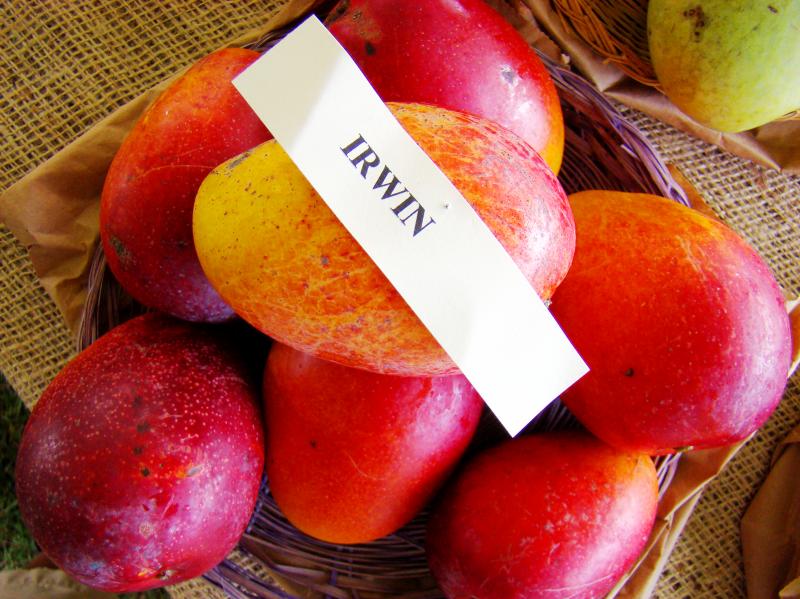May 31 to june 6
Douliuzai Village (斗六仔) was once considered the poorest settlement in Tainan’s Yujing District (玉井). The residents were often the butt of local jokes — one saying poked fun of their lack of money, yellowed faces and smelly feet.
The village’s fortunes drastically changed in the late 1960s due to the efforts of Cheng Han-chih (鄭罕池), who planted the nation’s first Irwin mango trees in 1962. By the early 1970s, everyone was growing the lucrative fruit and “Irwin mansions” sprouted up in the area. In 1973, the government established the first mango special agricultural zone in the village.

Photo: Wu Chun-feng, Taipei Times
While mangoes have been grown in Taiwan for about 400 years, the sweet, red Irwin variety introduced from the US has dominated the market in the past 50 years.
In the beginning, however, Cheng was the only farmer in Yujing willing to try planting the variety — and to his dismay, 96 of the 100 saplings he received perished during a cold front that winter. Cheng persisted and obtained another 100 the next year, and his efforts finally bore fruit in 1965.
Cheng still faced a slew of problems ranging from pest control to marketing, but he worked out the kinks and tirelessly promoted the new product to fellow farmers in his community. In 1967, the Yujing Farmers Association reported a whopping NT$300 million gross revenue (NT$2 billion today) from Irwin mangoes alone. By the 1970s, public perception had changed so much that anyone from Douliuzai was considered a wealthy person.

Photo: Liu Wan-chun, Taipei Times
Cheng died on June 1, 2018, and his status as the “Father of Taiwan’s Irwin mangoes” was cemented a year later when the Tainan City government installed a plaque on a column in front of his former residence.
MANGO HISTORY
Most sources agree that the Dutch introduced the mango to Taiwan about 400 years ago. Curiously, many official sources state the year of introduction as 1561 — but the Dutch didn’t even reach Southeast Asia until 1595, upon which it founded the Dutch East India Company (VOC) in present day Indonesia in 1602. Its colony in present-day Taiwan was established two decades later.

Photo courtesy of Wikimedia Commons
Taiwan’s first Dutch governor, Martinus Sonck, wrote to VOC headquarters in 1625, requesting them to send some horses and saplings of grape, lychee, durian and mango. This is more believable as the origin of the Dutch-introduced mango.
Ming and Qing Dynasty chronicles often state that Taiwan’s mango was introduced by the Dutch via Japan, but that’s also unlikely as mango farming didn’t begin in the southern island of Kyushu until the 1980s — also using saplings of the Irwin mango from the US. The Japanese colonial government actually tried to introduce the mango to nearby Ishigaki island from Taiwan during the 1930s, but this venture failed due to differences in climate.
The original mango is referred to as the “native mango” (土芒果) today, and it is still grown and eaten. Compared to the Irwin, however, it’s small, sour and fibrous, and is commonly made into candied or pickled products.
In 1954, Lu Chih-lin (陸之琳) of the Taiwan Agricultural Research Institute imported five types of mango from the US state of Florida. Lu grew up in an impoverished rural village in China, and after coming to Taiwan with the Chinese Nationalist Party (KMT), he put his efforts into searching for new products to improve the lives of the nation’s farmers.
After experimenting for a few years, his team deemed that the Irwin was most suited for Taiwan’s environment.
TIRELESS PROMOTION
By 1961, Lu was working for the Sino-American Joint Commission on Rural Reconstruction. The commission tasked him with promoting the Irwin mango in 11 areas in southern Taiwan, including Yujing. Cheng, who was mostly growing low-profit cassava and sugarcane, wanted to provide a better life for his children, but had no idea how to due to his lack of education.
After becoming an officer in the local farmer’s association, Cheng witnessed how farmers in other regions improved their finances through growing fruit (such as oranges in Chiayi) with government assistance. When Lu approached him regarding the Irwin mango, he said yes immediately and took home all 100 saplings allotted for Yujing. His neighbors thought he was crazy, and they seemed to be right when only four survived the cold front.
Lu rushed to the orchards and tried in his broken Hoklo (also known as Taiwanese) to convince the farmers to give it another try, but all of them refused except for Cheng, who worked closely with Lu for the next two years until they finally found success.
Problems soon arose, however, as the mango was especially susceptible to damage from the oriental fruit fly. Cheng noticed how lychee farmers in Kaohsiung used paper bags to protect their products, and he ordered mango-sized bags from a local factory. It worked, and the pest damage rate for his mangoes dropped to 5 percent.
Promoting the fruit was also a problem as locals were not used to its taste. Cheng traveled the country trying to find a buyer, and finally found his benefactor through a chance encounter with Taichung’s “Orange King,” Yeh A-mao (葉阿茂). The mangoes sold out within a few days, and soon his entire village was growing them.
In 1977, Cheng was named among the nation’s top 10 outstanding farmers. But his grandson Cheng Cheng-chin (鄭承靖) told Business Today (今日週刊) magazine in 2013 that many competitors tried to discredit his grandfather until 2009, when then-Tainan County commissioner Su Huan-chih (蘇煥智) visited Cheng and officially announced him as the “godfather of mangoes.”
Three years later, Cheng was made an honorary citizen of Tainan City. Yujing’s mangoes not only brought great economic benefit to the region, tourists also poured in to sample the delectable fruit at its source. A giant mango statue stands in the middle of a roundabout leading to the village, and mango ice shops line the streets.
Today, one of the four surviving trees from Cheng’s first attempt still stands in his grand-nephew’s yard. His sons and grandsons carry on his legacy in the orchard, proudly continuing to produce the fruit that has been nicknamed “the ruby of the summer.”
Taiwan in Time, a column about Taiwan’s history that is published every Sunday, spotlights important or interesting events around the nation that either have anniversaries this week or are tied to current events.

Towering high above Taiwan’s capital city at 508 meters, Taipei 101 dominates the skyline. The earthquake-proof skyscraper of steel and glass has captured the imagination of professional rock climber Alex Honnold for more than a decade. Tomorrow morning, he will climb it in his signature free solo style — without ropes or protective equipment. And Netflix will broadcast it — live. The event’s announcement has drawn both excitement and trepidation, as well as some concerns over the ethical implications of attempting such a high-risk endeavor on live broadcast. Many have questioned Honnold’s desire to continues his free-solo climbs now that he’s a

As Taiwan’s second most populous city, Taichung looms large in the electoral map. Taiwanese political commentators describe it — along with neighboring Changhua County — as Taiwan’s “swing states” (搖擺州), which is a curious direct borrowing from American election terminology. In the early post-Martial Law era, Taichung was referred to as a “desert of democracy” because while the Democratic Progressive Party (DPP) was winning elections in the north and south, Taichung remained staunchly loyal to the Chinese Nationalist Party (KMT). That changed over time, but in both Changhua and Taichung, the DPP still suffers from a “one-term curse,” with the

Jan. 26 to Feb. 1 Nearly 90 years after it was last recorded, the Basay language was taught in a classroom for the first time in September last year. Over the following three months, students learned its sounds along with the customs and folktales of the Ketagalan people, who once spoke it across northern Taiwan. Although each Ketagalan settlement had its own language, Basay functioned as a common trade language. By the late 19th century, it had largely fallen out of daily use as speakers shifted to Hoklo (commonly known as Taiwanese), surviving only in fragments remembered by the elderly. In

Lines between cop and criminal get murky in Joe Carnahan’s The Rip, a crime thriller set across one foggy Miami night, starring Matt Damon and Ben Affleck. Damon and Affleck, of course, are so closely associated with Boston — most recently they produced the 2024 heist movie The Instigators there — that a detour to South Florida puts them, a little awkwardly, in an entirely different movie landscape. This is Miami Vice territory or Elmore Leonard Land, not Southie or The Town. In The Rip, they play Miami narcotics officers who come upon a cartel stash house that Lt. Dane Dumars (Damon)